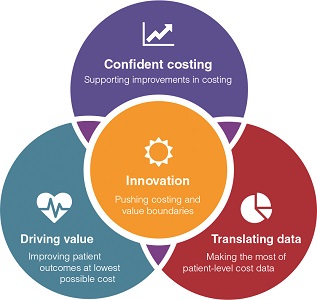Deal puts value in spotlight
The announcement of a sustained long-term funding deal took us all a little by surprise. The Saturday ahead of the announcement I was asked to attend a speech on Monday at a ‘secret’ location in north London and on Sunday it was released to the media.
As we commented at the time, the funding deal, while welcome, isn’t quite what we wanted. The Institute for Fiscal Studies/NHS Confederation report had suggested an average 4% increase was needed above inflation over the next 15 years to enable services to modernise. And they also suggested this would need to be front-loaded with 5% increases for the first five years. Against this measure, 3.4% – and confined to just the NHS England budget – still leaves the NHS with significant challenges.
The naked politics of the whole thing looks pretty opportunistic, linking the funding to a Brexit dividend. And then there is the whole debate about how the increase will be paid for. We’ll leave the politics to others, shall we? The reality is we’d have liked a bigger increase, but the system asked for more investment and it has it. It puts the service in a much better position than it was in and that has got to be good news.
The prime minister indicated there would be an increased focus on ensuring every penny of taxpayer’s money is ‘well spent’. This suggests a greater push with the value agenda and a reaffirmation of initiatives such as Carter, Getting it right first time and RightCare. Underpinning these will be the Costing Transformation Programme led by NHS Improvement and supported by our own Healthcare Costing for Value Institute.
The association has supported the push to get all NHS bodies costing at the patient-level for the best part of a decade. The work remains vital – better cost data means more informed local decision-making. Those involved in these efficiency initiatives are excited about the potential more granular cost data will deliver.
There is still a lot of work to do on costing, with key landmarks for the CTP over the next few years. But even once we’ve established a foundation of robust patient-level cost data, we need to embed the use of this data (alongside meaningful outcome data) in the week-to-week work of multidisciplinary teams – clinicians working with finance and managerial colleagues.
The delivery of value is surely the overarching aim of the transformation agenda.
All these components are reflected in the themes set by the Institute: confident costing; translating data; driving value; and innovation.
The Institute is the association’s forward agenda, not just concerned about healthcare today and tomorrow but long into the future. I’d like to thank all the organisational members of the group for their support, without which we would not be able to undertake this work.
Finally, I’d like to wish NHS England chief financial officer Paul Baumann well for his new role at Westminster Abbey. His analytical mind and good humour will be a loss to the NHS and a gain for the Church. I also congratulate past president Shahana Khan on her OBE – a great encouragement that the work of our finance leaders can be recognised in this way.
Related content
We are excited to bring you a fun packed Eastern Branch Conference in 2025 over three days.
This event is for those that will benefit from an overview of costing in the NHS or those new to costing and will cover why we cost and the processes.